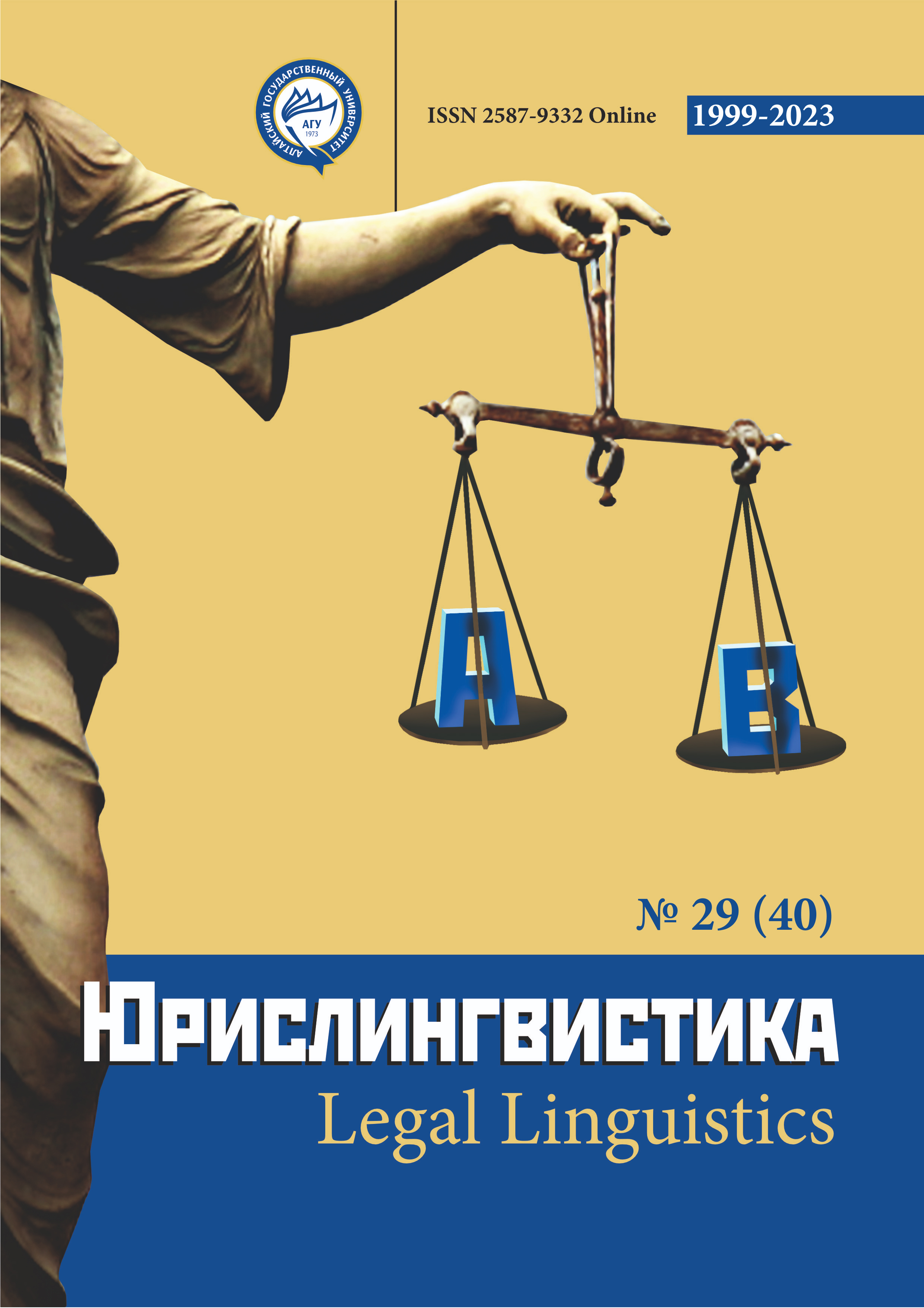E-Justice Texts: Factors of Borrowing Terms and Motivation
УДК 343.3/.7, ББК 67.408.1
Abstract
The research is based on the articles, overviews and reports of the participants of the academic research “Transformation of Legal Regulation of Relations, Connected with Application of Digital Technologies in Legal System and within the System of Enforcement of Court Rulings” from which there have been extracted and analyzed terms, recently borrowed from English into Russian, which occur in the texts of e-justice. There has been done an overview of the opinions of Russian and foreign linguists connected with the issue of acceptance of borrowings, that resulted in such features as expedience, common sense, and correspondence to the target language standard. There have been generalized extralinguistic and linguistic factors of borrowings.
There have been stated that transmitted terms are borrowed in a ready-made form. They are motivated lexemes in both languages. Being included in the complex hierarchical structure of micro- and macro-fields, the transmitted terms become integral elements of the term system, acquiring the semantic properties of the basic system-forming terms. Their Greek and Latin term elements support the process of internationalization of vocabulary and the ways of its formation.
Some unmotivated and partially motivated basic terms of the computer branch of knowledge are frequency terms for digital texts. These interdisciplinary terms meet the requirements of brevity, unambiguity, and lack of synonymity, which indicates their ideal compliance with the terminological nomination.
Downloads
Metrics
References
Академик URL: https://dic.academic.ru/dic.nsf/ruwiki/941024
Афанасьев С. Ф., Борисова В. Ф. Правовое регулирование процессуальных прав и обязанностей, осуществляемых в электронной форме участниками гражданского судопроизводства / Правовая культура. - 2021. - № 1(44). - С. 52-57.
Багана Ж. Английские заимствования в русском и немецком языках в условиях глобализации: монография. М., 2020.
Гринёв С. В. Введение в терминоведение. М., 1993.
Давыдова М. Л. Формирование и нормализация юридической терминологии в сфере цифровых технологий / Вестник ВолГУ. Серия 2. Языкознание. - 2020. - № 19. - С. 52-63.
Даниленко В. П. Русская терминология. М., 1977.
Дьяков А. И., Чирейкина О. Ю. Англицизмы в русских терминологических системах / Международный научно-исследовательский журнал. - 2020. - № 5. - С. 43-47.
Елисеева И. А., Николи Н. К. Причины заимствования англицизмов в современном русском языке / Наука и производство Урала. - 2020. - № 16. - С.114-116.
Информационные технологии в правосудии. URL: https://ilr.hse.ru/data/2020/07/14/1597449494/Информационные%20технологии%20в%20правосудии.pdf
Крысин Л. П. Слово в современных текстах и словарях: Очерки о русской лексике и лексикографии. М., 2008.
Лотте Д. С. Вопросы заимствования и упорядочения иноязычных терминов и терминоэлементов. М., 1982.
Малярчук-Прошина У. О., Бурлаченко К. А. Иностранные заимствования в научно-технической литературе / Тенденции развития науки и образования. - 2020. - № 58-10. - С. 4-50.
Мультитран. URL: https://www.multitran.com/m.exe?l1=1&l2=2&s=interface
Невдяев Л .М. Телекоммуникационные технологии. 2002 URL: https://www.studmed.ru/nevdyaev-lm-telekommunikacionnye-tehnologii_bf9b39d3ad7.html
Поляков В. В. К проблеме использования понятия «искусственный интеллект» в криминалистике / Юрислингвистика. - 2022. - № 25. - С. 21-28.
Право-300. URL: https://pravo.ru/interpravo/news/view/73753/
Рубцова Е. В. Оценка причин заимствований иностранных слов в русскоязычной бизнес-сфере / Региональный вестник. - 2020. - № 5 (44). - C.71-72.
Слепович В. С. Английские заимствования в русском тексте / Вестник Белорусского государственного экономического университета. - 2020. - № 4 (141). - С. 97-103.
Современный толковый словарь URL: https://classes.ru/all-russian/russian-dictionary-encycl-term-44746.htm
Солдаткина О. Л. Цифровое право: особенности цифровой среды и субъекты / Государство и право. - 2019. - № 12. - C.113-123.
Суперанская А. В., Подольская Н. В., Васильева Н. В. Общая терминология: вопросы теории. М., 1989.
Хижняк С. П. Юридическая терминология: формирование и состав Саратов. 1997.
Cabre, M. Teresa. Terminology. Theory, Methods and Applications. Amsterdam, 1999.
Executive.ru. URL: https://www.e-xecutive.ru/wiki/index.php/Облачные_технологии
Hoffer B. L. Language Borrowing and Language Diffusion: an Overview / Intercultural Communication Studies XI:4. 2002. URL: http://web.uri.edu/iaics/files/01-Bates-L.-Hoffer.pdf
Lingvo live URL: https://www.lingvolive.com/ru-ru/translate/en-en/file
Oxford learner’s dictionaries URL: https://www.oxfordlearnersdictionaries.com/definition/english/big-data?q=big+data
Safonov L. Хабр. URL: https://habr.com/ru/post/327740/
What is cloud computing? URL: https://www.investopedia.com/terms/c/cloud-computing.asp
What is computer forensics? URL: https://www.datarecovery.co.nz/forensic-investigation/what-is-computer-forensics/
Copyright (c) 2023 Надежда Калмазова

This work is licensed under a Creative Commons Attribution 4.0 International License.
The authors, which are published in this journal, agree to the following conditions:
1. Authors retain the copyright to the work and transfer to the journal the right of the first publication along with the work, at the same time licensing it under the terms of the Creative Commons Attribution License, which allows others to distribute this work with the obligatory indication of the authorship of this work and a link to the original publication in this journal .
2. The authors retain the right to enter into separate, additional contractual agreements for the non-exclusive distribution of the version of the work published by this journal (for example, to place it in the university depository or to publish it in a book), with reference to the original publication in this journal.
3. Authors are allowed to post their work on the Internet (for example, in a university repository or on their personal website) before and during the review process of this journal, as this may lead to a productive discussion, as well as more links to this published work (See The Effect of Open Access).










